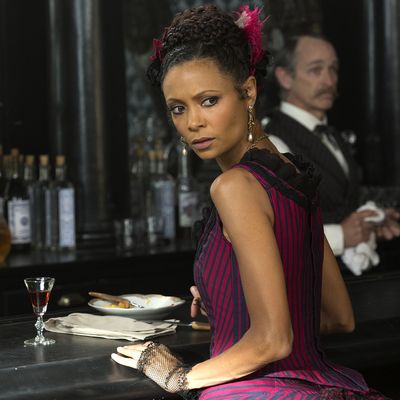
Despite the bombast of the Westworld finale, which depicts the bloody dawning of the cyborg uprising, it’s really the quieter moments that haunt. Almost all of them involve Maeve, the cyborg written to be a tough-talking madam who becomes self-aware, played with exceeding grace by Thandie Newton.
Newton is nominated for Best Supporting Actress in a Drama for her performance in the HBO series at this Sunday’s Emmy Awards, against a crop of heavy hitters. There’s Chrissy Metz from NBC’s teary-eyed phenom This Is Us. Uzo Aduba continues to bring care to her character on Orange Is the New Black. Millie Bobby Brown has become one of the most sought-after young actors thanks to her turn in the nostalgia exercise Stranger Things. Samira Wiley and Ann Dowd brought empathy and villainy, respectively, to The Handmaid’s Tale. But it’s Newton’s work that proves to be the most audacious and engaging — she elevates a series that would be merely a sleekly produced puzzle without her.
Westworld centers around a Wild West–esque theme park in which unnervingly human-looking cyborgs are screwed and killed in increasingly dramatic ways. It’s the kind of science-fiction series that sacrifices character development for a labyrinthine plot that hinges on keeping its viewers in the dark. It’s a tactic that stirs a lot of conversation, but can often work against great acting. While Westworld is a fun series, it isn’t a wholly memorable one, save for Newton. Her fierce portrayal of Maeve as she grapples with past iterations of herself, her current role as a sex worker, and transition into consciousness hints at what the series could be — one that more sincerely considers the themes bubbling beneath the surface about the act of (self-)creation, and the ways men seek to control women. Newton offers a sense of both intimacy and grandeur that the show sacrifices elsewhere to obfuscate the workings of Robert Ford (Anthony Hopkins), the founder and director of Westworld. She provides a blistering emotional through line and lends gravity to Maeve’s arc about becoming and identity.
It’s also trickier work than it appears at first glance. It would be very easy for an actor to get lost in the machinations of Westworld, given the magnitude of its moving parts, to focus on the big reveals and more arch turns rather than the subtle moments that add to a character’s internal life. But Newton does. Everything from the slight faltering of her voice to the vulgar elegance of her walk give you a sense of Maeve’s internal life, and her view of herself.
Newton is a frontrunner in her category — her biggest competition is Millie Bobby Brown as the superpowered, exceedingly sheltered and stoic Eleven in Stranger Things, and Ann Dowd as the brutalizing embodiment of internalized sexism, Aunt Lydia, in The Handmaid’s Tale. While Brown’s performance is capable, it isn’t all that nuanced unless you’re grading on a curve of child actors. Dowd is a consistently excellent actress and The Handmaid’s Tale bolsters her chances given the show’s status as a feminist-tinged dystopia. But her performance feels like a blunt instrument compared to the deft touch Newton provides Westworld. (It’s fascinating to observe that all three of these actresses are working in series that are unabashedly science fiction even if they aren’t marketed as such, which is an outlier in Emmys history.) Newton’s work rises above her competitors not only because of her graceful physicality, the way she uses her voice, and her ability to elevate Westworld — she’s also a joy to watch in ways few performances nominated for important awards are.
While this is definitely more true in the world of film than television, it’s still the case that performances that make the labor of acting visible tend to be the most lauded. These are the kinds of performances undergirded by sorrow, trauma, and a sense of understatement, often to the point of inscrutability, making audiences work hard to understand the internal landscape of the character. Instead, Newton revels in the pleasure principle. Her performance is playful, sexy, and emotionally moving, and only becomes more so as the show progresses. There’s a paucity of performances in dramas that are this poignant and fun, that marry great craft with an interest in leaning into movie-star charisma, beauty, and the bliss that comes from an entertaining televisual experience. Whether Maeve is slitting the throat of a technician or having sex with fellow cyborg/outlaw Hector (Rodrigo Santoro) amid roaring flames, it’s clear Newton is relishing the role. She’s having fun and wants the audience to have fun, too.
Listen to the malevolent intelligence her voice carries when she wakes from her slumber and expresses the desire to form an army. Look at the serpentine grace she lends Maeve when she’s walking toward the train in the finale or verbally tearing down the men around her, even when she’s completely naked. Maeve makes her first truly conscious decision when she gets off that train in order to find the young girl who was her daughter in a past iteration of her story. It’s a powerful moment signaled in an earlier scene when she’s talking to the tech, Felix (Leonardo Nam), who gets roped into her revolutionary plot and looks at her with the same mix of awe and fear I do. “She was never my daughter anymore than I was … whoever they made me,” Maeve says. Her voice, typically clear and resonant, falters. Her eyes are trained not on Felix but on some distant horizon, perhaps thinking of the past she still needs to reckon with. In this brief scene, Newton reveals how her voice and body act as a narrative of their own, sharpening Maeve’s arc with wit and beauty. In many ways, Newton’s performance is a master class in physical and verbal grace — the Emmy should be hers for the taking.


